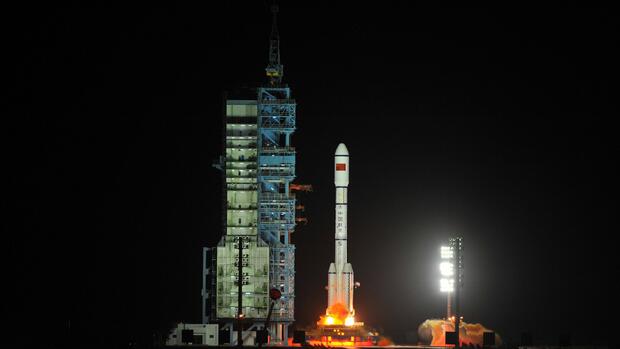A floating launch platform in the North Sea is planned for the German “Space Station”.
(Photo: imago stock&people)
Berlin The SPD parliamentary group calls for significant progress in establishing space travel in Germany. Above all, it needs its own infrastructure, the Social Democrats have stated in a concept paper that is to be decided by the parliamentary group on Tuesday. The document, which is available to the Handelsblatt, says: “Germany needs independent access to space.”
Specifically, the Social Democrats want to achieve that within the Federal Republic of Germany’s own launch capacities for carrier rockets and satellites are built up. The planned mobile launch platform in the North Sea is therefore a good start.
You don’t have to imagine the planned German “space station” like Cape Canaveral in the USA or Baikonur in Kazakhstan. Instead, a floating launch platform in the North Sea is planned: From a special ship with a launch pad, it should go into space as soon as possible – for small launchers that transport satellites the size of a shoe box.
These are part of the new multi-billion dollar “New Space” market. “New Space” refers to the increasing commercialization of space travel. The launch platform in the North Sea is a key component in opening up this “Made in Germany” market.
By 2030 alone, 15,200 satellites will be sent into space worldwide – 90 percent of them will be small satellites, estimates the Federation of German Industries (BDI). “Space technologies are innovation drivers,” says SPD economic politician Sebastian Roloff. They are able to advance the entire industry, whether in climate and environmental protection, security infrastructure, telecommunications or mobility. The BDI also says: “Satellites and the data generated by them are rapidly gaining in importance.” They are the key to future technologies such as autonomous driving, Industry 4.0 and data-driven business models.
“We view the monopolization of critical space infrastructure with concern”
According to the BDI, the first space launches from the North Sea could possibly work out as early as this year: “Germany thus has the rare opportunity to play a leading global role in a future field with little investment.”
Despite the explosion: SpaceX describes the Starship test as a success
However, the SPD parliamentary group demands that the use of the financial resources must be strategically planned. In their paper, they write: “It is crucial to develop the budget for the national space program in such a way that we can act on an equal footing with our international partners.”
Because Germany is in danger of being left behind. China, for example, has significantly increased its efforts in space travel. In the US, it is mainly private companies like Space-X owned by Tesla boss Elon Musk who want to take over space – even though one of his unmanned “Starship” rockets exploded during a test shortly after launch last week.
And especially in Japan, big steps are currently being taken. An Ispace probe is scheduled to land on the lunar surface on Wednesday evening, Tokyo time, and release a “rover” there for exploration.
It would be the first landing of a private company. Japan could thus play a leading role in the race for the moon – with German technology, but without direct German participation – hardly noticed by the world public. The probe, called M1, is a development from the Federal Republic.
The reason for the global struggle alongside the satellites for dominance on the moon are the poles there. There is ice from which drinking water for humans and hydrogen as fuel for machines can be extracted.
The SPD politicians do not want to promote developments like those in Japan or the USA any further. “We are concerned about a private monopolization of critical space infrastructure,” says their concept paper. Rather, a clear state framework is needed.
>> Read here: SpaceX’s Starship rocket explodes on first test flight
So the paper of the Social Democrats does not come out of nowhere. Rather, the federal government has decided to present a national space law. The proposals from the SPD could now speed up the process. However, the paper would not result in a law after a possible decision, but is intended as food for thought for the government.
More: How a Japanese company wants to make history on the moon
